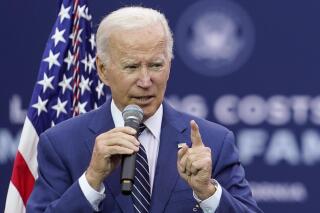Video of Biden singing ‘Baby Shark’ is a deepfake

President Joe Biden speaks about lowering costs for American families at Irvine Valley Community College, in Irvine, Calif., Friday, Oct. 14, 2022. A video of Biden from the event was manipulated using deepfake technology to make it appear as though he was singing the children’s song “Baby Shark.” However, some social media users shared it as real. (AP Photo/Carolyn Kaster)
CLAIM: A video shows President Joe Biden singing the children’s song “Baby Shark” while speaking in California.
AP’S ASSESSMENT: Altered video. Footage from Biden’s remarks at a community college in Irvine, California, on Friday was manipulated using deepfake technology to make it appear he was singing the tune. The man who made the altered video told The Associated Press that he used deepfake technology to create it.
THE FACTS: The video, which first appeared on TikTok, has been circulating widely on social media in recent days.
It begins with Biden saying, “Ladies and gentlemen, and now, our great national anthem.” But rather than singing “The Star-Spangled Banner” he sings the opening lyrics of “Baby Shark” into a microphone while standing at a podium. Text at the bottom of the screen, looking as it would in a news broadcast, reads: “BIDEN : PRICE OF CHARGERS DROPS DUE TO MINING.” A logo like that of the satirical news site The Onion appears next to the text. Additional text overlaid on the video states, “BIDEN LOST IT,” “#NOT MY PRESIDENT” and “World Leader!!!!”
An Instagram post, which had been removed from the platform as of Wednesday, featured a shortened version of the video accompanied by profanity-laced comments by a man who criticized Biden for such levity when the world is facing issues like Russia’s war in Ukraine and food shortages.
Posts on TikTok featuring the video were accompanied by comments expressing similar disbelief. “What in the world,” one read. “He’s lost his mind.” Another stated: “Ladies & Gentlemen, This is who’s leading this country! How?!?!?!”
But Ali Al-Rikabi, a civil servant based in the United Kingdom, told the AP that he altered an existing video of Biden with software from GitHub, a website where developers can share code, to create the deepfake.
“The audio, obviously, is not real,” he said. “That was synthesized using available technology, publicly available technology.”
The video footage of Biden comes from remarks he gave about the Inflation Reduction Act at Irvine Valley College.
Al-Rikabi explained that he used two programs — voice cloning software to make Biden sing the “Baby Shark” lyrics and lip syncing software to make his lips match the words. “This is a deepfake I made,” he commented on a TikTok post featuring the original version of the video, which he had uploaded to his account SyntheticVoices. It had received approximately 416,000 views as of Wednesday.
Asked where the text that appeared next to the Onion logo came from, Al-Rikabi said he made it up. “I like to give little giveaways in the clips to see if people are paying attention,” he said.
Matt Groh, a computational social scientist at MIT Media Lab who researches deepfake technology, told the AP that one of the ways he was able to identify the video as a deepfake was by looking at Biden’s cheeks and lips.
“It doesn’t look as smooth as you’d expect given the quality of the rest of the video,” he said. “If you’re going to try to identify what’s wrong with this thing you’d want to identify how the lips are moving because the way you produce one kind of deepfake is by lip syncing. And it appears, if I was to guess, that that’s what’s going on.”
___
This is part of AP’s effort to address widely shared misinformation, including work with outside companies and organizations to add factual context to misleading content that is circulating online. Learn more about fact-checking at AP.
